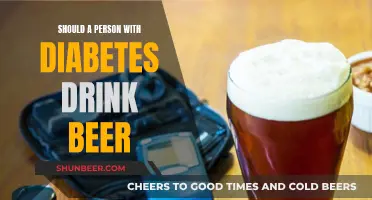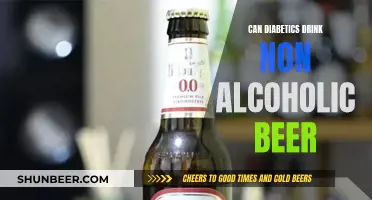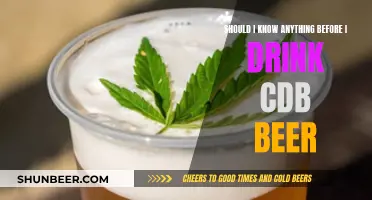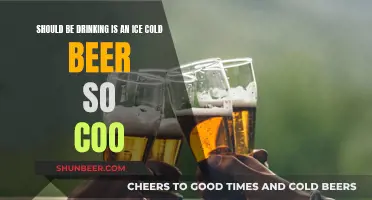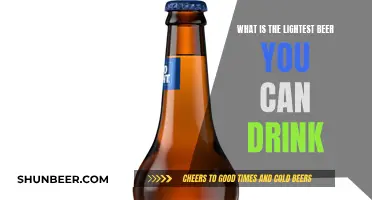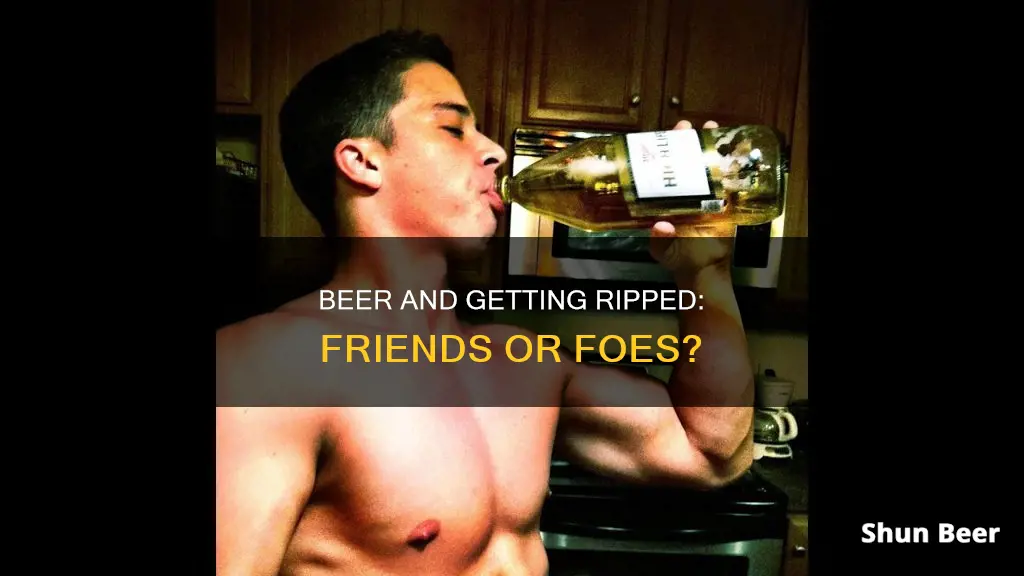
Drinking beer and getting ripped are not mutually exclusive. While beer is calorically dense and can hinder fat metabolism, it does not automatically lead to weight gain or prevent fat loss. Alcohol is processed differently by the body and is not an essential nutrient. It is converted to a substance called acetate, which reduces the amount of fat burned for energy. Additionally, alcohol can increase appetite and lead to overeating. However, studies have shown that consuming small amounts of alcohol daily, such as a glass of wine with dinner, is unlikely to cause fat gain or prevent one from reaching their fat-loss goals. The key is moderation. Excessive drinking can have negative health consequences and lead to alcohol dependence, but occasional consumption can be part of a healthy meal plan. To get ripped while still enjoying beer, it is important to monitor intake, be mindful of triggers, and ensure it aligns with one's overall health and fitness goals.
| Characteristics | Values |
|---|---|
| Calories in 12 oz of Beer | 153 |
| Calories in 12 oz of Light Beer | 103 |
| Calories in 5 oz of Red Wine | 125 |
| Calories in 3 oz of Sake | 117 |
| Calories in 1.5 oz of Liquor | 97 |
| Alcohol's effect on lipid oxidation | 73% decrease |
| Alcohol's conversion in the body | Converted to a substance called acetate |
| Alcohol content converted to fat | 3-5% |
| Alcohol's effect on appetite | Increases |
| Alcohol's calorific density | High |
| Alcohol's classification as a nutrient | Non-essential |
| Alcohol's processing in the body | Treated as a toxin |
What You'll Learn

Alcohol calories and fat metabolism
Alcohol is high in kilojoules and can increase your appetite, leading to poor food choices and excess calorie consumption. The additional calories from alcohol and its impact on fat metabolism can contribute to weight gain, particularly in the abdominal area, resulting in the infamous "beer gut".
Alcohol also affects the liver, an essential organ in the metabolism of fats, carbohydrates, and proteins. Excessive alcohol consumption can lead to alcoholic fatty liver, which damages the liver and impairs its ability to metabolise and store nutrients properly. This disruption in nutrient metabolism can make it challenging to lose weight.
Furthermore, alcohol interferes with the normal functioning of the pancreas, which is crucial for healthy digestion. Alcohol intake can cause stress on the stomach and intestines, leading to decreased digestive secretions and impaired movement of food through the digestive tract. As a result, the absorption and utilisation of nutrients are hindered, further affecting weight management.
While alcohol consumption can impact your fitness goals, moderation is key. Consuming small amounts of alcohol, such as a glass of wine with dinner, is unlikely to hinder your fat loss goals significantly. It is essential to understand your relationship with alcohol and make informed choices to support your health and fitness journey.
Beer and Trimethoprim: A Safe Mix?
You may want to see also

Alcohol alternatives
While it is not necessary to completely give up alcohol to get ripped, it is important to understand that alcohol is calorically dense and can hinder fat metabolism. Therefore, if you are aiming to get ripped, it is advisable to explore alternative drinks that can help you cut back on alcohol consumption.
- Non-alcoholic beverages: Opt for non-alcoholic drinks such as mocktails, alcohol-free wine, or non-alcoholic beer or cider. These drinks allow you to enjoy the taste and ritual of drinking without consuming alcohol or its associated calories.
- Kin Euphorics: Kin Euphorics offers a range of non-alcoholic functional beverages that are layered with adaptogens, nootropics, and botanics to nourish your mind and body. Their drinks are designed to boost your mood, enhance your energy, and promote feelings of calm and mellowness.
- Apothekary's Stop Your Wine-ing Supplement: This powdered supplement is designed to help reduce stress, build immunity, and provide anti-inflammatory benefits. While it may not deliver a rich taste, it can offer a calming effect similar to that of a glass of wine.
- Kanna Extract Powder: Kanna is a plant indigenous to South Africa that has been used to elevate mood, relieve tension, and promote a tranquil state of mind. It can be mixed with tea or other beverages as a natural alternative to alcohol, helping to reduce anxiety without causing drowsiness.
- Drinkwel Better Mornings Premium Multivitamin Supplement: This supplement is designed to aid in recovery after a night of drinking alcohol. It replenishes lost vitamins and minerals, helping to reduce the negative effects of a hangover.
- Haus Apertifs: Haus offers a range of flavored aperitifs with low alcohol content, inspired by European traditions. Their drinks are made with natural ingredients, providing a lighter option for those who want to avoid the foggy feeling of a hangover.
Remember, the key to getting ripped while consuming alcohol is moderation. These alternatives can help you reduce your alcohol intake and make more mindful choices to support your fitness goals.
Beer at Work: German Work Culture Explored
You may want to see also

Detox symptoms
While it is not necessary to completely abstain from drinking beer to get ripped, reducing your alcohol consumption may help you reach your fat-loss goals. Alcohol is calorically dense, with 12 oz of beer containing 153 calories and 13.9 grams of alcohol. Light beer is only slightly better, with 103 calories and 11 grams of alcohol per 12 oz.
Alcohol also has a negative impact on fat oxidation, reducing the amount of fat your body burns for energy. A study published in the American Journal of College of Nutrition found that when men were given two drinks of vodka and sugar-free lemonade, their lipid oxidation dropped by 73%.
If you are drinking heavily and decide to quit or cut down, you may experience alcohol detox or withdrawal symptoms as your body adjusts to the absence of alcohol. These symptoms can range from mild to severe and life-threatening and usually begin within six to 24 hours of stopping or significantly decreasing alcohol consumption.
Mild symptoms of alcohol withdrawal can include:
- Headache
- Mild anxiety
- Insomnia
- Increased blood pressure
- Increased heart rate
- Hyperthermia (high body temperature)
- Tremors (shakiness) of hands or other body parts
More severe alcohol withdrawal symptoms can include:
- Hallucinations
- Seizures
- Delirium tremens (DTs), which include vivid hallucinations and delusions
The severity and length of alcohol withdrawal vary based on several factors, including how much and how long you drank, your body chemistry, any coexisting physical or mental health conditions, the medications you take, and whether you use other substances.
If you experience any concerning symptoms of alcohol withdrawal, it is important to seek medical help. While mild cases may not require more than a supportive environment, severe cases may require treatment in a hospital, sometimes in the ICU.
Orthodox Christians: Beer During Fasting, Allowed or Not?
You may want to see also

Social drinking
Understand the Effects of Alcohol
Alcohol is calorically dense, with 7 calories per gram, and it is processed differently from other macronutrients. It is not an essential nutrient, and when ingested, your body identifies it as a toxin and works to remove it. Alcohol can temporarily hinder fat metabolism and severely lower the body's fat oxidation rate, which can impact your fat-loss goals. Additionally, alcohol can increase your appetite and make you want to eat more.
Set Clear Goals and Limits
Determine your reasons for wanting to get ripped and reduce your alcohol intake. Write down your goals and keep them visible as a reminder and source of motivation. Set a drinking goal and daily limit that aligns with recommended guidelines: no more than one standard drink per day for women and men over 65, and no more than two standard drinks per day for men under 65.
Keep a Drinking Diary
For a few weeks, track every drink you consume, including the type and amount of alcohol, and the location and company you were with. This will help you identify patterns and triggers and allow you to compare your drinking habits with your goals.
Avoid Alcohol at Home
Remove alcohol from your home to reduce temptation and make it less convenient to drink. This simple step can help you cut down on your alcohol intake.
Practice Saying No
Social situations often involve drinking, and you will likely be offered drinks. Prepare yourself by practising how to politely decline. You don't have to give a detailed explanation, but having a simple response ready, such as "I'm cutting back" or "I don't feel like drinking today", can make it easier to refuse.
Choose Alcohol-Free Days
Decide on a day or two each week when you won't drink any alcohol. This will help you develop a healthier relationship with alcohol and may even improve your physical and emotional well-being.
Find Alternative Social Activities
Drinking is often a social activity, but there are plenty of other ways to socialise. Join a gym, take up a new hobby, or find sober social groups to enjoy social connections without the focus on alcohol.
Seek Support
Let your trusted friends and family know about your goals and ask for their support. They can help keep you accountable and provide encouragement. You can also reach out to other sober people or join support groups to find a community of like-minded individuals.
Remember, moderation is key. While you may not need to quit social drinking entirely, being mindful of your alcohol intake and implementing these strategies can help you stay on track with your fitness goals.
Beer: Kidney Stone Remedy or Myth?
You may want to see also

Drinking triggers
Alcohol can be a trigger for overeating. While drinking alcohol may not directly lead to weight gain, it can lower your inhibitions and stimulate your appetite. A 2002 study in Denmark verified that alcohol can act as a potent appetite stimulant. A group of men ate more food when served a meal with beer or wine than with a soft drink.
Several factors come into play when discussing drinking triggers. Firstly, it is essential to understand your relationship with alcohol. Examining why you drink and identifying your triggers are crucial steps in managing alcohol consumption. Common triggers include stress, social situations, and emotional distress. Stress, in particular, can lead to increased alcohol consumption and overeating. It is a contributing factor to the release of cortisol, a hormone that increases appetite.
Secondly, drinking alcohol can hinder your body's ability to burn fat. A study published in the American Journal of College of Nutrition found that when men were given two drinks of vodka and sugar-free lemonade, their fat-burning capacity dropped by 73%. Alcohol is calorically dense, with 7 calories per gram, and it is processed differently from other nutrients. When ingested, your body identifies alcohol as a toxin and works to remove it. This process can temporarily hinder fat metabolism.
Additionally, the social aspect of drinking cannot be overlooked. Drinking with friends or in social gatherings can make it challenging to refuse a drink or stop at a certain number of drinks. The influence of peers and the desire to fit in can be powerful triggers for drinking.
Finally, drinking can become a habitual response to stress or overwhelming emotions. If you tend to drink at a certain time of day or in specific situations, it may be easier to give in to the urge.
To manage drinking triggers, it is essential to develop alternative coping mechanisms and make conscious choices. Some strategies include:
- Identifying triggers and exploring alternative ways to address them.
- Removing alcohol from your immediate environment to reduce temptation.
- Finding replacement beverages, such as water, flavored sodas, or teas.
- Engaging in activities that distract you from drinking, especially those that involve physical activity.
- Practicing self-care, such as regular exercise, healthy eating, and adequate sleep, to improve physical and mental resilience.
- Reaching out for support from friends, family, or professional services if needed.
Beer and Anxiety: A Complex Relationship
You may want to see also
Frequently asked questions
It is not necessary to completely quit drinking beer to get ripped, but it is important to moderate your intake. Beer is calorically dense and can hinder fat metabolism, so it should be consumed in moderation as part of a healthy meal plan.
Alcohol is processed differently by the body compared to other macronutrients. It lowers the body's fat oxidation rate, reducing the amount of fat burned for energy.
Strategies to reduce alcohol intake include setting a drinking goal, keeping a drink diary, avoiding alcohol at home, drinking slowly, choosing alcohol-free days, and finding alternative coping mechanisms for stress.
Reducing alcohol intake can lead to clearer skin, better sleep, improved mood, and weight loss. It can also lower the risk of health problems associated with excessive drinking, such as high blood pressure, heart disease, and stroke.
Write down your reasons for wanting to cut down and keep them visible as a reminder. Celebrate small wins along the way and seek support from friends, family, or professionals if needed.



